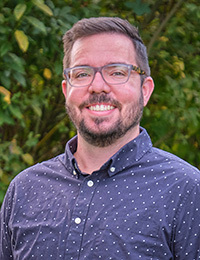A Passion for Transportation Solutions

Curtis Walton
Assistant Transportation Engineer, Seattle Department of Transportation
Curtis Walton has always had a passion for transportation. The son of an airplane mechanic, Curtis eventually worked at Boeing as a mechanical engineer until he became interested in the idea of sustainable transportation. “I was looking for something that aligned with my own personal values and allowed me to make a positive impact on my local community,” Curtis says.
Curtis enrolled in the UW Master of Sustainable Transportation and graduated in 2020. He credits his degree with helping him change fields and obtain a new position working for the Seattle Department of Transportation (SDOT).
Tell us about your new position at SDOT.
I recently started working in the Product Development Division at the Seattle Department of Transportation. In this role I’ll be involved in several really interesting projects. The first will be looking into improving pedestrian and bicycle safety along the Aurora Corridor, which I’m very excited about. I’ll also be working on what are called neighborhood home zones, which will examine ways to reduce vehicle speeds and improve neighborhood safety.
I’ve been very fortunate to land a job working on transportation systems in my own city — it’s this immediate feedback loop that makes me feel very proud of the work I'm doing.
How did you get interested in sustainable transportation?
I’ve always been interested in science and engineering, and I worked for several years as an engineer at Boeing. Problem-solving is just a lot of fun for me. As time went on, I increasingly realized that while I enjoyed working on planes, I was a lot more passionate about trying to make our world more sustainable. The more I learned, the more I realized how big an impact transportation can have on sustainability.
I started volunteering for Seattle Neighborhood Greenways and reading as much as I could about sustainable transportation. I was looking for ways to make an impact and eventually I decided that I wanted to make that my career.
Why did you choose the UW Master in Sustainable Transportation?
When I discovered UW’s MST program it just sounded like a perfect fit. As I read through the description and the different class offerings, I found that the program covered a lot of things I was interested in, like the way transportation designs can impact climate change, how land-use policies relate to transportation solutions, and the various ways transportation planning can impact a community’s overall quality of life.
At that time the MST was a pretty new degree, but I met with some of the faculty and they were very informative and encouraging. The program also offered me a lot of scheduling flexibility, which was great, and because the program is online I was able to continue working my job at Boeing while I took classes.
What were the most significant things you took away from your degree?
The knowledge covered in the classes was very in-depth and helpful. I learned a lot about regulatory structures, research methodologies and various transportation planning methods, all of which are extremely important when you’re trying to make changes in the real world. I also completed a capstone project that examined how changes to bicycle infrastructure can affect how often and in what ways people ride bicycles.
In addition to the coursework, the network I found at the UW — both with the instructors and my fellow students — has had a huge impact on me. There was just such a diversity of backgrounds in class; we had engineers and city planners, people with so many different jobs.
For example, when we learned about environmental impacts and air quality, the classroom discussions involved people who already worked in government and knew the rules and regulations, and they were able to say, “Well, here’s how it actually works, and here are the constraints you have to deal with.” They really helped me get a balanced view and showed me how I could funnel some of my idealism into practical solutions.
What sort of growth opportunities do you see in this field?
That’s a very timely question, because Congress recently passed a new Infrastructure bill (H.R. 3684). I think we’re going to see a lot of new transportation projects in the coming years. We’re starting to see some American cities take sustainability much more seriously than in the past, and I think all that’s going to snowball forward and create a lot of new opportunities.
What would you say to someone interested in the UW Master of Sustainable Transportation?
It’s a lot of fun, and it’s also a lot of work. The flexibility is great, especially if you already have a job, and the things I learned in class and the networking connections I made have had a huge impact on my life.
If you’re like I was and are thinking about a career change, I’d encourage you to reach out and talk with a faculty member or a graduate to get an idea of what the program is like. It can be scary to make a change this big, but you might be surprised to find out how easily your existing skills can transfer and be applied to a new career.